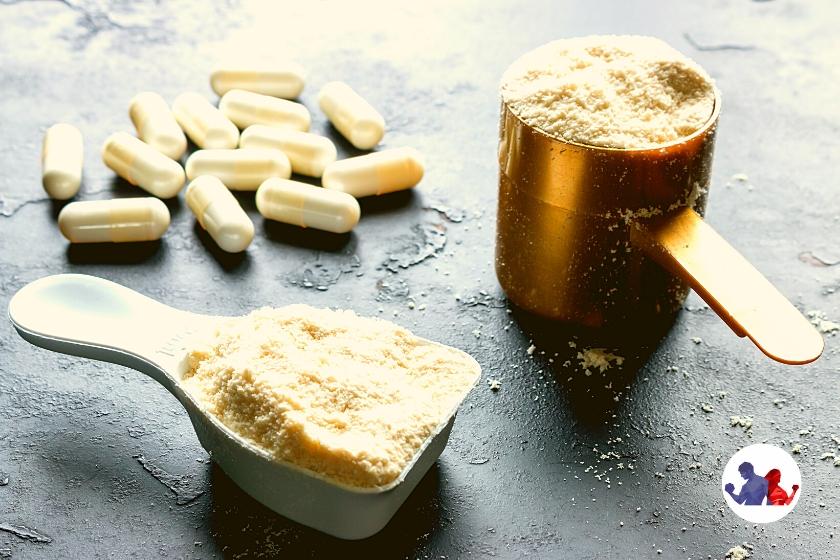In this article, we will review a number of scientific studies to determine the best time to take creatine.
As well as being one of the most popular supplements around, creatine is also one of the most rigorously studied supplements.
Research suggests that boosting creatine levels can lead to significant increases in muscular strength, power, and size.
Furthermore, for the majority of individuals, creatine will be safe to consume with few side effects associated with it.
While the benefits and safety of creatine are clear, many are unsure about when creatine should be taken.
Table of Contents
What Is Creatine?
Creatine is a molecule that can be found within the body with 95% of creatine stored in skeletal muscle (1).
Taking creatine supplementally can increase the levels of creatine stored within the muscles. This can have a direct impact on athletic performance and general health.
Research on creatine accredits this to the role that it plays in cellular energy production.
Creatine is required for energy regeneration and it directly impacts another substance known as Adenosine Triphosphate (or ATP).
ATP is the energy-giving compound that is fundamental for metabolism and muscular function.
With high-intensity exercise, ATP will deplete quickly – typically within 8-10 seconds (2). By increasing phosphocreatine (stored creatine) levels, the time taken to depletion increases.
This occurs as creatine helps to regenerate ATP rapidly thus allowing exercise to be maintained for longer.
By increasing the amount of energy available, the muscles are capable of creating more powerful contractions. This helps to explain the improvements in power, strength, and size.
Why Take Creatine?

This section will review a number of scientific articles and highlight five benefits associated with creatine supplementation.
1. Improves Muscular Strength
As mentioned, taking creatine supplements can increase the amount of energy available for the muscles to use during high-intensity activity.
As a result, muscles can generate more power with each contraction and consequently lift heavier loads.
One review study split participants into two groups – creatine supplemented group and a non-supplemented group.
The results showed a significant difference in strength with the supplemented group in comparison to the non-supplemented group (3).
Two meta-analysis studies determined that creatine has the potential to increase strength gains by 5–10% (4, 5).
2. Facilitates Muscle Hypertrophy
In a similar way, creatine supplements may also lead to an increase in muscle size.
For significant muscle growth to occur, strength training is evidently required. However, the methods of strength training that we utilize will significantly impact muscle growth.
For optimal growth, training volume should be high. Studies have shown that great growth can be attained by increasing total training volume (6).
As highlighted, creatine can impact ATP production and allow us to sustain exercise for longer. Therefore, creatine supplements may help us lift heavier loads at a larger volume.
A study on weightlifters found that those who took creatine experienced two to three times more growth than those who didn’t (7).
3. Enhances Athletic Performance
By increasing the amount of creatine stored within the muscles, more power can be generated by the muscles. As a result, explosive and powerful movements will improve.
Despite the vast body of studies, no study has ever found creatine to have a negative impact on high-intensity performance (8).
Many studies that have revolved around creatine and sprinting. Results from these studies have consistently indicated that creatine supplements improve sprinting ability.
One specific study determined that creatine substantially improved forty-meter sprint performance (9).
A further study investigating shorter sprints found that creatine enhanced both five and fifteen-meter sprint times (10).
4. Promotes Injury Prevention
Unfortunately, there are a number of myths surrounding the use of creatine. One of which is that creatine can cause dehydration and muscle cramping.
Research does not concur. In actuality, studies have found that creatine supplements may prevent dehydration and episodes of cramping (11).
Interestingly, another study determined that muscle tightness, strains, pulls, and non-contact injuries appear to occur less often in creatine users (12).
Finally, creatine may also be beneficial in rehabilitation. Results from studies suggest that creatine may reduce damage and help to maintain muscle size and strength (13).
5. Enhances Brain Health
Thus far, these benefits have revolved around physical abilities and athletic performance. However, creatine may also positively impact the brain.
As with the muscles, the brain needs ATP to function and can also store phosphocreatine. Therefore, creatine supplements may increase ATP production and enhance brain function.
Studies have suggested that taking creatine may reduce the risk of developing neurological diseases (14).
Furthermore, creatine supplements are used to treat the symptoms of a number of neurological conditions such as Alzheimer’s, Huntington’s, and Parkinson’s (15).
Best Creatine Supplements
Our team have picked up the best creatine supplements currently on the market to support your goals.The Importance Of Creatine Timing
The benefits that creatine can have on the body are clear. However, if we are looking to maximize the effects, there are a number of considerations to be made.
There has been much debate over creatine timing. Should creatine be taken pre or post-workout?
There are four options when taking creatine on training days.
The first two options are to take the supplement either just before or after the training session.
Alternatively, creatine could also be taken at a time that is not close to the training session.
A final option would be to divide the daily dose and take it several times throughout the day.
In the following sections, we will discuss some of these approaches and provide a number of creatine timing recommendations.
Taking Creatine Before You Exercise
The theory behind taking creatine pre-workout is that doing so optimizes creatine levels and energy production in time for high-intensity work.
While many studies have been completed on the effects of creatine, only a few have analyzed the impact of taking creatine pre-workout.
From the limited studies available, results tend to suggest that taking creatine pre-workout is as effective as post-workout (16).
However, more research is required to confirm these findings.
Taking Creatine After You Exercise
That said, a handful of studies have suggested that taking creatine post-workout is more effective.
One particular study split participants into two groups. One group took five grams of creatine prior to training while the other took five grams of creatine after training.
After four weeks, those who took creatine post-workout experienced a more substantial increase in muscle mass. Furthermore, fat mass was also reduced to a greater extent (17).
However, it must be noted that other studies have reported no significant differences (16).
Therefore, it is currently unclear whether taking creatine pre or post-workout is best.
Creatine On Rest Days?
Creatine must still be taken on rest days. The purpose of doing so is to maintain a high level of creatine within the muscle.
The conventional way of supplementing creatine involves two phases – a loading and a maintenance phase.
Loading creatine over the space of seven to ten days rapidly increases creatine levels to optimize improvements.
Once this loading phase has been completed, maintenance follows. In this phase, the dosage is reduced significantly to keep creatine levels high.
Therefore, on rest days, providing the correct dosage is being used, creatine timing is insignificant.

When Is The Absolute Best Time To Take Creatine?
While there are still questions surrounding pre or post-workout timings, research does suggest that creatine should be taken close to exercise.
Taking a creatine supplement long before or long after the exercise is suboptimal and not recommended.
One ten-week study divided subjects into two groups.
The first group took a supplement either just before or after exercise. Meanwhile, the second group took the supplement in the early morning or late evening.
The study determined that the first group achieved greater improvements in strength than the second group (18).
As a result, it is recommended that creatine is consumed close to exercise – immediately before or after will suffice.
The Bottom Line
Creatine is a superb supplement that is not only safe but is highly effective. Increasing levels of creatine in the body through supplements can enhance energy production.
Research on the substance has indicated that creatine can increase muscle strength, size, and power. In addition, it may also reduce injury risk and promote brain health and function.
In terms of supplement timing, more research is required as only a handful of studies currently exist.
From the research that has been conducted, creatine should still be taken on non-training days to maintain high phosphocreatine levels, Supplement timing appears to be insignificant.
However, on training day, creatine should be taken immediately pre or post-workout to maximize its effect.
It is currently unclear whether taking creatine pre-workout or post-workout is best. Therefore, future research should look to determine which approach is the most advantageous.
Best Creatine Supplements
Our team have picked up the best creatine supplements currently on the market to support your goals.- https://www.ncbi.nlm.nih.gov/pmc/articles/PMC3407788/
- https://pubmed.ncbi.nlm.nih.gov/9627907/
- https://pubmed.ncbi.nlm.nih.gov/14636102/
- https://pubmed.ncbi.nlm.nih.gov/27328852/
- https://pubmed.ncbi.nlm.nih.gov/25946994/
- https://www.ncbi.nlm.nih.gov/pmc/articles/PMC6303131/
- https://www.ncbi.nlm.nih.gov/pubmed/10449017
- https://www.ncbi.nlm.nih.gov/pubmed/12701815
- https://www.ncbi.nlm.nih.gov/pubmed/9809381
- https://pubmed.ncbi.nlm.nih.gov/10694141/
- https://pubmed.ncbi.nlm.nih.gov/18184753/
- https://www.ncbi.nlm.nih.gov/pmc/articles/PMC5469049/
- https://www.ncbi.nlm.nih.gov/pmc/articles/PMC3407788/#__sec8title
- https://www.ncbi.nlm.nih.gov/pmc/articles/PMC4304302/
- https://pubmed.ncbi.nlm.nih.gov/18652079/
- https://pubmed.ncbi.nlm.nih.gov/24392772/
- https://pubmed.ncbi.nlm.nih.gov/23919405/
- https://pubmed.ncbi.nlm.nih.gov/17095924/
